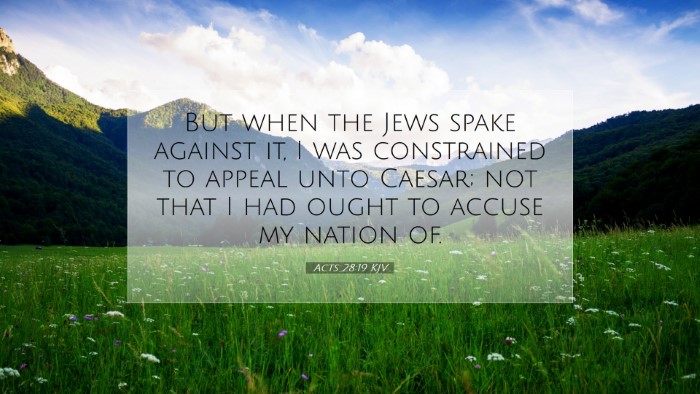Commentary on Acts 28:19
The verse Acts 28:19 states: "But when the Jews spoke against it, I was compelled to appeal to Caesar; for I had nothing to accuse my nation of." This pivotal statement from the Apostle Paul while in Roman custody reveals various theological and practical insights significant for understanding his ministry and the early church's challenges.
Contextual Analysis
This verse occurs at the conclusion of the Book of Acts, highlighting Paul's resilience amidst opposition. His appeal to Caesar signifies both a legal strategy and a divine orchestration of his mission to reach Rome. The broader context reveals Paul as a prisoner, yet undeterred in proclaiming the gospel. His experience encapsulates the tension between Jewish leaders and the nascent Christian faith.
Theological Insights
-
Divine Providence:
Paul's appeal to Caesar demonstrates God's sovereignty. Throughout Scriptures, God's hand can be seen directing events, and here, a mere legal appeal becomes a mechanism for fulfilling the Great Commission (Matthew 28:19-20). According to Matthew Henry, God's plans cannot be undermined by human opposition.
-
Jewish Rejection:
Paul's reference to the Jews speaking against him indicates the growing divide between Jewish leaders and the early church. Albert Barnes highlights this as a significant turning point, illustrating how the message of Jesus transcended traditional Israelite boundaries to encompass Gentiles.
-
Justice and Advocacy:
Paul’s legal appeal also reflects a paradigm of justice. By appealing to Caesar, Paul upholds the Roman legal system, seeking to clear accusations against himself while drawing attention to his divine mission. Adam Clarke remarks on Paul's shrewdness in using the apparatus of the state, indicative of how Christians can engage with governmental structures for the furtherance of the gospel.
Practical Applications
-
Engaging with Opposition:
Pastors and leaders are called to remain steadfast in the face of opposition. Paul’s example teaches us to continue advocating for truth and justice, even when confronted with resistance from within our own communities.
-
Cultural Relevance:
Paul's ability to navigate Roman law serves as a reminder for modern Christians to engage thoughtfully with contemporary societal structures. Students of theology should recognize the implications of faith interacting with cultural and legal frameworks.
Conclusion
Acts 28:19 encapsulates profound themes central to the Christian faith: resilience, advocacy, and the relentless spread of the gospel amidst opposition. The insights drawn from historical and theological commentaries reaffirm that Paul’s journey is not merely a story of personal struggle but a testament to the unfolding plan of God in history. Pastors, scholars, and students are encouraged to delve deeper into these complex realities as they reflect on the ongoing mission of the church today.


